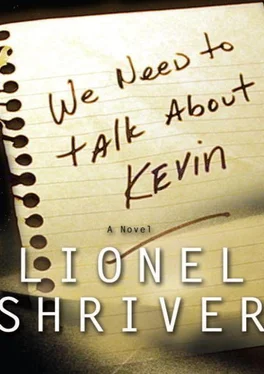The hallway rings with a dry chuckle. I clip back to the kitchen. I’ve spilled coffee on my skirt.
So. I know you must have wondered. Why didn’t I simply walk out? Nothing stopped me from grabbing Celia while she still had one eye left and hightailing it back to Tribeca. I could have left you with your son and that horrible house, a matched set. After all. I had all the money.
I’m not sure you’ll believe me, but it never occurred to me to leave. I may have spent long enough in your orbit to have absorbed your ferocious conviction that a happy family cannot be a mere myth or that even if it is, better to die trying for the fine if unattainable than sulking in passive, cynical resignation that hell is other people you’re related to. I hated the prospect of defeat; if in bearing Kevin to begin with I picked up my own gauntlet, bearing Kevin on a daily basis involved rising to a greater challenge still. And there may have been a practical side to my tenacity as well. He was about to turn fifteen. He had never spoken of college—had never spoken of his adult future at all; never having expressed the slightest interest in a trade or profession, for all I knew he was sticking to his five-year-old vow to go on welfare. But theoretically our son was out of the house in about three years. Thereafter, it would just be you, me, and Celia, and then we would see about that happy family of yours. Those three years are almost over now, and if they have proved the longest of my life, I had no way of anticipating that at the time. Lastly, and this may strike you as simplistic, I loved you. I loved you, Franklin. I still do.
Nevertheless, I did feel under siege. My daughter had been half blinded, my husband doubted my sanity, and my son was flouting his butter-greased penis in my face. Abetting the sensation of assault from all sides, Mary Woolford chose this of all times to make her first indignant visit to our house—and the last, come to think of it, since the next time we’d meet would be in court.
She was still whippet slim then, her dark hair jet to the roots so I’d never have known it was dyed; the way it was pinned up was a tad severe. Even to make this neighborly call she was dressed to the nines in a Chanel suit, a demure jeweled spray on her lapel twinkling with respectability. Who’d have guessed that a scant three years later she’d be shambling the Nyack Grand Union in a streaked outfit that needed pressing and vandalizing raw eggs in the child seat of another woman’s cart.
She introduced herself curtly, and, despite the chill, declined an invitation inside. “My daughter, Laura, is a lovely girl,” she said. “A mother would naturally think so, but I believe her attractiveness is also apparent to others. With two important exceptions: Laura herself, and that young man of yours.”
I wanted to reassure the woman that by and large, my surly son failed to see the attractiveness of anyone, but I sensed that we were still in the preamble. This sounds unkind considering that my son would, in just over a year, murder this woman’s daughter, but I’m afraid I took an immediate dislike to Mary Woolford. She moved jaggedly, her eyes shifting this way and that, as if roiling from some constant inner turmoil. Yet some people coddle their own afflictions the way others spoil small pedigreed dogs with cans of pâté. Mary struck me straight off as one of this sort, for whom my private shorthand was Looking for a Problem—rather a waste of detective powers I always thought, since in my experience most proper problems come looking for you.
“For the last year or so,” Mary continued, “Laura has suffered under the misapprehension that she is overweight. I’m sure you’ve read about the condition. She skips meals, she buries her breakfast in the trash, and lies about having eaten at a friend’s. Laxative abuse, diet pills—suffice it to say that it’s all very frightening. Last September she got so frail that she was hospitalized with an intravenous drip, which she would tear out if not watched round the clock. Are you getting the picture?”
I mumbled something feebly commiserating. I would normally lend a sympathetic ear to such stories, though just then I couldn’t help thinking that my daughter was in the hospital, too, and not—I was fiercely convinced—because she done anything stupid to herself. Besides, I’d heard too many Karen Carpenter tales at Gladstone PTA meetings, and they often took the form of boasts. The prestigious diagnosis of anorexia seemed much coveted not only by the students but by their mothers, who would compete over whose daughter ate less. No wonder the poor girls were a mess.
“We had been making progress,” Mary continued. “For the last few months she’s submitted to her modest portions at family meals, which she is compelled to attend. She’s finally gained a little weight back—as your son Kevin was more than eager to point out .”
I sighed. In comparison to our visitor, I must have looked haggard. What I wouldn’t have looked is surprised, and my failure to gasp oh-mygoodness-me-what-has-that-boy-done seemed to inflame her.
“Last night I caught my beautiful daughter vomiting her dinner! I got her to admit, too, that she’s been making herself upchuck for the last week. Why? One of the boys at school keeps telling her she’s fat ! Barely 100 pounds and she’s tormented for being a ‘porker’! Now, it wasn’t easy to get his name out of her, and she begged me not to come here tonight. But I for one believe it’s time we parents start accepting responsibility for our children’s destructive behavior. My husband and I are doing everything we can to keep Laura from hurting herself. So you and your husband might please keep your son from hurting her, too!”
My head bobbed like one of those dogs in car windows. “Ho-ow?” I drawled. It’s possible she thought I was drunk.
“I don’t care how—!”
“Do you want us to talk to him ?” I had to tighten the corners of my mouth to keep them from curling into an incredulous smirk all too reminiscent of Kevin himself.
“I should think so!”
“Tell him to be sensitive to the feelings of others and to remember the Golden Rule ?” I was leaning on the door jamb with something close to a leer, and Mary stepped back in alarm. “Or maybe my husband could have a man-toman chat , and teach our son that a real man isn’t cruel and aggressive, but a real man is gentle and compassionate?”
I had to stop for a second to keep from laughing. I suddenly pictured you jaunting into the kitchen to report, Well, honey, it was all a big misunderstanding! Kevin says that poor skin-and-bones Laura Woolford simply heard wrong! He didn’t call her “fat,” he called her “fab”! And he didn’t say she was a “porker”—he said she told a joke that was a “corker”! A grin must have leaked out despite me, because Mary turned purple and exploded, “I cannot for the life of me understand why you seem to think this is funny!”
“Ms. Woolford, do you have any boys?”
“Laura is our only child,” she said reverently.
“Then I’ll refer you back to old schoolyard rhymes as to just what little boys are made of. I’d like to help you out, but practically? If Franklin and I say anything to Kevin, the consequences for your daughter at school will be even worse. Maybe it’s better you teach Laura—what do the kids say? To suck it up .”
I would pay for this bout of realism later, though I could hardly have known then that my hard-bitten counsel would be trotted out in Mary’s testimony at the civil trial two years hence—with a few acid embellishments for good measure.
“Well, thank you for nothing!”
Читать дальше












